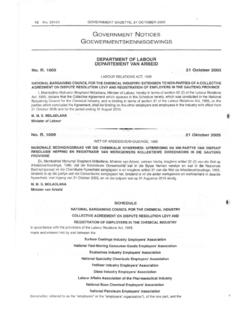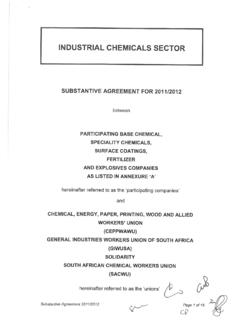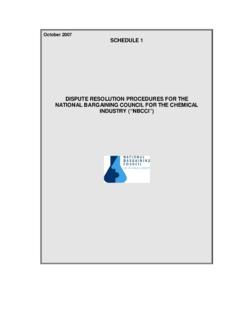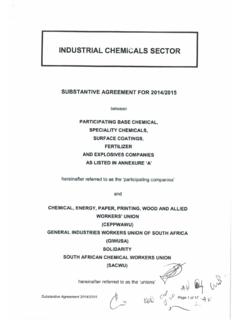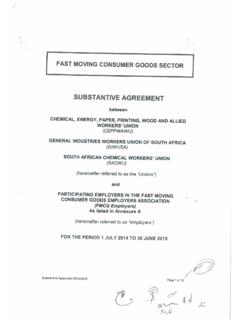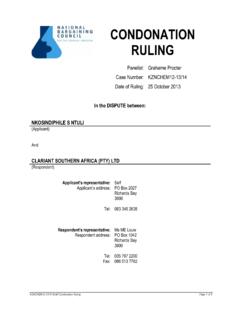Transcription of BARGAINING COUNCIL FOR THE CHEMICAL …
1 All correspondence should be addressed to the General Secretary - Ms Ingrid Dimo Page 1 5 Hollard Street, Marshalltown, 2107 PO Box 61418, Marshalltown, 2107 E-mail: Telephone: (011) 833 0922 Fax: (011) 833 0921 BARGAINING COUNCIL FOR THE CHEMICAL INDUSTRY INFORMATION SHEET 1. INTRODUCTION In addition to governmental institutions, such as the Department of Labour, that regulates industrial relations in the CHEMICAL Industry, the most important industry regulatory body is the National BARGAINING COUNCIL for the CHEMICAL Industry (the NBCCI). The COUNCIL was officially registered on 3rd December 2001 and has three core functions, namely the negotiation of wages and conditions of service, the enforcement of negotiated agreements and the prevention and resolution of labour disputes in the Industry.
2 2. BACKGROUND TO BARGAINING COUNCILS BARGAINING councils were previously known as industrial councils and have been a feature of South African industrial relations since 1924. The concept of an industrial COUNCIL was, and still is, to promote what is termed self-governance in an industry by the representative employers organisations and trade unions in that industry. The traditional functions of industrial councils have always been the negotiation and enforcement of agreements and the settlement of disputes thus achieving the overall objective of labour peace in the industry concerned. The setting up and administration of various retirement and insurance funds for the benefit of employees have been other traditional functions of industrial councils.
3 All correspondence should be addressed to the General Secretary - Ms Ingrid Dimo Page 2 The Labour Relations Act of 1995 has broadened the functions of industrial councils, now known as BARGAINING councils, to include input into policy and law. This is in line with other elements of government policy in terms of which a role is foreseen for BARGAINING councils to participate in national economic and industrial policy formulation. The NBCCI, for instance, is specifically empowered to make submissions to NEDLAC. The role of BARGAINING councils must be seen against the background of the primary objectives of the LRA, which include, amongst others, the promotion of orderly collective BARGAINING and collective BARGAINING at sectoral level. BARGAINING councils can therefore be seen as a cornerstone of the South African system of labour relations.
4 BARGAINING councils are established by agreement between employers organisations and trade unions. The LRA requires both parties to be sufficiently representative of the interests and the area for which the COUNCIL seeks registration. This requirement is aimed at ensuring that the organisations involved in setting up a BARGAINING COUNCIL have at least a substantial portion of employers and employees in the industry concerned as members. The NBCCI, similarly, was granted registration on the basis of the parties being sufficiently representative of the CHEMICAL Industry in South Africa. 3. ESTABLISHMENT OF THE NBCCI The following employers organisations and trade unions agreed to the establishment of the NBCCI in 2001: Employers organisations:- Surface Coating Industry Employers Association National Fast Moving Consumer Goods Employers Association Explosives Industry Employers Association National Speciality Chemicals Employers Association Fertiliser Industry Employers Association Labour Affairs Association of the Pharmaceutical Industry National Petroleum Employers Association All correspondence should be addressed to the General Secretary - Ms Ingrid Dimo Page 3 Glass Industry Employers Association National Base Chemicals Employers Association These nine organisations were and still are representative of employers in the nine sectors in the CHEMICAL Industry.
5 Trade Unions:- CHEMICAL , Energy, Paper, Printing, Wood and Allied Workers Unions (CEPPWAWU) South African CHEMICAL Workers Union (SACWU) South African Workers Union Mynwerkersunie National Employees Trade Unions Mynwerkersunie and the South African Workers Union have since 2001 merged to form the Solidarity trade union. Following a merger, the National Employees Trade Union was replaced on the COUNCIL by the United Association of South Africa (UASA). Because UASA no longer met the membership requirements of the COUNCIL , it stopped being a party union some years ago. The constitution of the NBCCI requires a trade union to have at least 2 000 members in the CHEMICAL Industry to be admitted as a party. There are no such pre-conditions applicable to employers organizations to be admitted as a party to the COUNCIL .
6 The General Industries Workers Union of South Africa (GIWUSA) has in the meantime been admitted as a party trade union. The current parties to the COUNCIL are still the nine founding employers organisations as mentioned above, and four trade unions, namely: CEPPWAWU, SACWU, Solidarity and GIWUSA. All correspondence should be addressed to the General Secretary - Ms Ingrid Dimo Page 4 4. LEVIES BARGAINING councils are funded by levies payable on a 50/50 basis by employers and employees in the industry for which the COUNCIL has been registered. The power to impose levies is contained in the constitution of a BARGAINING COUNCIL . Once parties have reached an agreement on a levy, it is not necessary, in terms of section 34 of the Basic Conditions of Employment Act, for employees individually to specifically agree in writing to levy deductions from their salaries.
7 At the moment, the obligation to pay levies to the NBCCI only applies to so-called parties to the COUNCIL , those companies that are members of one of the nine employers organisations which have been admitted as parties to the COUNCIL , and their employees. The intention of the COUNCIL is eventually to cover all employers and employees in the CHEMICAL Industry. A process is currently underway in terms of which the COUNCIL will seek the extension of its agreements to so-called non-parties in terms of section 32 of the Labour Relations Act. When NBCCI agreements are eventually extended to all employers in the Industry, non-parties will also become liable to pay levies to the COUNCIL . Levies are used to fund the operations of a BARGAINING COUNCIL . This involves all normal operating expenses such as salaries for the administrative and case management staff, office expenses, meeting expenses, cost of dispute resolution and negotiation expenses.
8 The Labour Relations Act contains very stringent control measures regarding the finances of BARGAINING councils. In practice not all employees of a company would benefit from all the services of a BARGAINING COUNCIL . Employees at a more senior level, who are commonly not highly unionized, would for instance not benefit from the collective BARGAINING functions of a BARGAINING COUNCIL . Their salaries and other conditions of service are commonly determined by management, based on job performance. All correspondence should be addressed to the General Secretary - Ms Ingrid Dimo Page 5 To cater for the fact that not all employees would benefit equally from the services of the COUNCIL , the NBCCI has introduced a differentiated levy structure, namely one for employees in the so-called BARGAINING unit and one for employees who do not fall within the BARGAINING unit.
9 The concept of a BARGAINING unit is not officially defined anywhere, not even in the Labour Relations Act. Basically it means that group of employees for whom wages and conditions of service are negotiated by the party trade unions. These employees therefore derive a benefit from the COUNCIL that employees outside the BARGAINING unit do not enjoy. The founding parties to the COUNCIL agreed that 50% of the levy should be allocated to the wage BARGAINING benefit and the other 50% of the levy to the COUNCIL s dispute resolution benefit. Employees falling within the BARGAINING unit of a company benefit from both the collective or wage BARGAINING services as well as the dispute resolution services of the COUNCIL while employees who are outside the BARGAINING unit only benefit from the dispute resolution services of the COUNCIL (as will be more fully explained under paragraph 6 of this information sheet).
10 Employees falling outside company BARGAINING units therefore only pay half the levy. It should be noted that there is as yet no common BARGAINING unit in either the CHEMICAL Industry or in any of its sectors. At this stage, each company still has to define its own BARGAINING unit, which will be dependent on its own individual industrial relations situation, particularly the level of unionization in the company. It is common for BARGAINING units to be regulated by plant level recognition agreements entered into between the company and the union or unions that have a substantial number of members in the company. All correspondence should be addressed to the General Secretary - Ms Ingrid Dimo Page 6 5. SCOPE OF REGISTRATION OF THE COUNCIL The scope of registration of the NBCCI, in terms of the certificate of registration issued by the Registrar of Labour Relations, is the CHEMICAL Industry as defined, in the Republic of South Africa.
